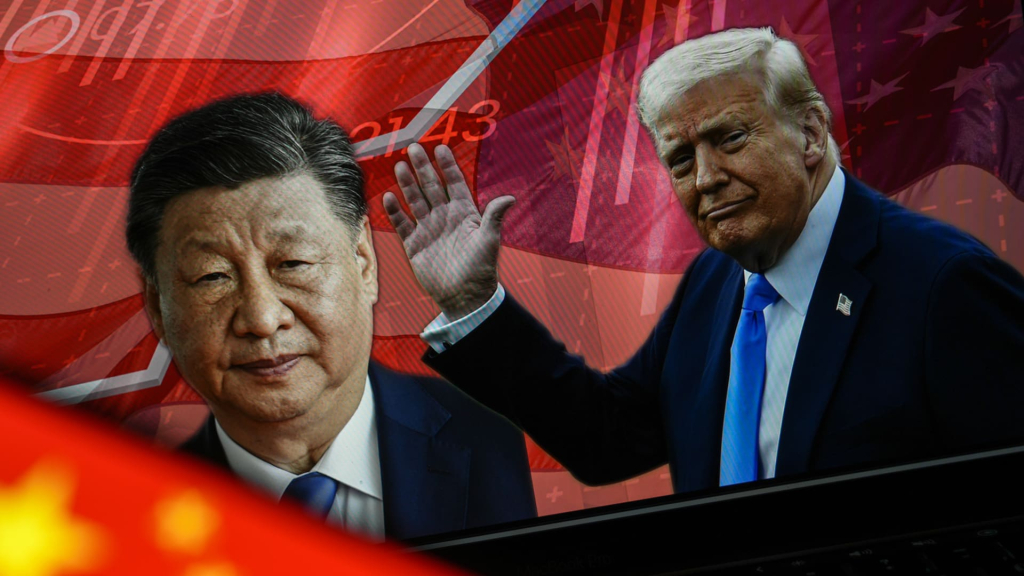In a significant development last week, China declared its halt in retaliatory measures against U.S. President Donald Trump’s tariffs, labeling any potential hikes by the U.S. as a “joke” and asserting that it would “ignore” them moving forward.
Rather than intensifying its tariff strategies, Beijing is now pivoting to alternative tactics, specifically those targeting the American services industry.
The Trump administration has sharply increased U.S. tariffs on various goods imported from China, imposing rises of up to 245% following numerous rounds of retaliatory action. In response, China branded these measures as a “meaningless numbers game” before introducing additional levies on U.S. imports, with rates soaring as high as 125%.
While the U.S. administration persistently presses on with its tariff agenda, China has introduced a range of non-tariff restrictions, which include tightening the export of rare-earth minerals and launching antitrust investigations into major American corporations, including pharmaceutical giant DuPont and technology leader Google.
Prior to this latest round of tension, in February, China created a so-called “unreliable entity” list, impacting numerous U.S. businesses and limiting their capacity to trade within China. Notable additions to this list included firms like PVH, which owns Tommy Hilfiger, and Illumina, a manufacturer of gene-sequencing technology.
Beijing’s recent restriction on the export of critical minerals will necessitate that Chinese firms obtain special licenses to sell these resources abroad, effectively limiting U.S. access to essential minerals required for the production of semiconductors, missile defense technologies, and solar panels.
On Tuesday, China escalated its actions by targeting Boeing, America’s leading exporter, instructing Chinese airlines to suspend all deliveries of its aircraft and halting purchases of related equipment and parts from American suppliers, as reported by Bloomberg.
This ban on deliveries is expected to exacerbate the challenges faced by Boeing, which is already grappling with a sustained quality-control crisis.
In a notable sign of rising tensions, Chinese authorities issued notices for the apprehension of three alleged individuals connected to cyberattacks against China on behalf of the U.S. National Security Agency.
Chinese state media, which reported on the notices, encouraged domestic users and businesses to steer clear of American technologies in favor of local alternatives.
“Beijing is clearly signaling to Washington that it has various avenues for retaliation, all of which can inflict varying degrees of pain on American companies,” remarked Wendy Cutler, vice president at the Asia Society Policy Institute.
“With tariffs and additional restrictions already established, we are witnessing a full-scale decoupling of the two economies,” Cutler added.
Targeting trade in services
Some analysts view China’s strategy as an attempt to broaden the scope of the trade war to include the services sector, which encompasses travel, legal, consulting, and financial services, where the U.S. has maintained a significant surplus with China for multiple years.
A recent suggestion from a social media account tied to the Chinese state-owned Xinhua News Agency indicated that Beijing may impose restrictions on U.S. legal consulting firms and examine the operations of American companies in China for potential “monopoly benefits” stemming from intellectual property rights.
According to Nomura estimates, China’s imports of U.S. services have increased more than tenfold over the last two decades, reaching $55 billion in 2024, which has propelled the U.S. services trade surplus with China to $32 billion last year.
Last week, Chinese authorities announced plans to limit imports of American films and cautioned citizens against traveling or studying in the U.S., reflecting Beijing’s strategy to exert pressure on U.S. entertainment, tourism, and education sectors.
These targeted measures affect high-visibility industries—aviation, media, and education—that resonate politically in the U.S., noted Jing Qian, managing director at the Center for China Analysis.
Despite potential low direct financial impacts from these smaller sectors, “the reputational consequences, such as fewer Chinese students or more cautious Chinese employees, could have lasting effects on academia and the technology talent landscape,” he added.
Nomura anticipates that around $24 billion could be jeopardized if Beijing escalates restrictions on travel to the U.S.
The travel sector has been a major contributor to U.S. service exports to China, representing spending by millions of Chinese visitors in the United States, as highlighted by Nomura. Within this sector, education-related expenditures lead, accounting for 71% and predominantly arising from tuition and living costs for over 270,000 Chinese students enrolled in American educational institutions.
Entertainment exports, comprising films, music, and television shows, contribute a mere 6% to U.S. exports in this domain, according to the investment firm, which emphasized that Beijing’s recent restrictions on film imports “may carry more symbolic significance than economic impact.”
“We may observe a deeper decoupling—not just in supply chains but also in personal connections, knowledge transfers, and regulatory practices. This could signify a transition from mere transactional discord to systemic division,” Qian explained.
Can Beijing get more aggressive?
Experts anticipate that Beijing will persist in employing its suite of non-tariff strategies as it seeks to enhance its bargaining position ahead of any prospective negotiations with the Trump administration.
“From the viewpoint of the Chinese government, the operations of U.S. companies in China represent the primary leverage for inflicting discomfort on the U.S. side,” asserted Gabriel Wildau, managing director at risk advisory firm Teneo.
Corporations such as Apple, Tesla, and multiple pharmaceutical and medical device firms could find themselves in Beijing’s crosshairs as the country continues to implement non-tariff actions, including sanctions, regulatory scrutiny, and export controls, Wildau added.
While ongoing negotiations might allow both nations to alleviate some retaliatory actions, prospects for immediate discussions between the two leaders appear to be diminishing.
Chinese officials have repeatedly denounced Trump’s “unilateral tariffs” as acts of “bullying” and have pledged to “resist to the end.” Nonetheless, Beijing remains open to dialogue, insisting that talks must occur on “an equal footing.”
On Tuesday, White House press secretary Karoline Leavitt stated that Trump is willing to negotiate with China, provided Beijing initiates the first step.
“Ultimately, only when a country endures sufficient self-inflicted harm might it consider easing its stance and return to the negotiation table,” remarked Jianwei Xu, an economist at Natixis.


























